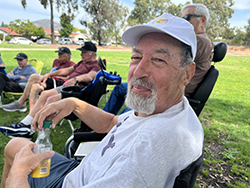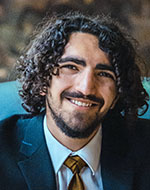By Donald H. Harrison

SAN DIEGO – A group of 18 Jewish men, who have nicknamed themselves “The Bagel Boys” arranged their chairs under a shade tree at a local park on Friday and shared stories about flying in and out of Israel just as the war with Hamas was getting underway.
Mark Stern, who had been visiting with relatives and touring Israel, said he first became aware of the situation in southern Israel last Saturday, Oct. 7, after a cousin, whom he was supposed to visit, told him, “Don’t come, the sirens are going off.”
Once it became clear that Hamas terrorists had slaughtered youngsters at a music festival and had attacked Israeli towns and villages near the Gaza border, Stern and his wife Judy decided to return home as early as possible ahead of the United Air Lines flight from Tel Aviv to Los Angels that had been scheduled for a few days later.

By telephone, they made reservations on Royal Jordanian Airlines to fly to Amman, from whence they would fly to London, and then on to San Diego. They arrived at Ben-Gurion Airport four hours early.
“If you can picture madness, triple it,” Stern said. The line through security seemed like 1,000 people long, and when they finally got to the ticket counter, “the flight was canceled.”
“We were sitting there with our bags, and I went to every counter – Emirates, Dubai, and airlines that I had never hard of. No flights!”
Turkish Airlines was still flying, Stern said, but there were hundreds of people waiting for too few tickets that day. So the Sterns took a $70 cab ride back to Tel Aviv, and found themselves a hotel from which they could keep phoning for reservations.
They were able to book a flight to Istanbul, Turkey, for Monday, Oct. 9 Remembering the fiasco at the airport on Saturday, they left their hotel at 1:15 a.m. to arrive at the airport at 2 a.m. “The security line wasn’t as bad because it was the middle of the night,” he stated. They went to the counter of the Turkish airline, where the status board showed numerous flights either canceled or delayed. Their 6:30 a.m. flight sat on the tarmac for 1 ½ hours before taking off.
It was a relief to be homeward- and safety-bound, even though because of extremely narrow seats, “it was the worst flight I’ve ever been on. I couldn’t sleep. Fortunately it got down to Los Angeles, and then we flew down to San Diego.” From the time they had left their hotel to landing on Tuesday, Oct. 10, in San Diego, 31 hours had elapsed.
Stern took away from Israel a strong impression that “the people are so united; there is not one negative person there. The hotel clerks, the people in the souk, the people in the store where I got coffee, everyone said the same that ‘we are united, we are going to get through this, we are going to be stronger.’”
*

I was able to tell a story that might be considered a counterpoint to Stern’s tale. Our grandson, Shor, arrived in Israel just eight hours before the war broke out to take a master’s degree at Tel Aviv University in, ironically, conflict resolution and mediation.
It was a long United Airlines flight direct from San Francisco, which Shor found exhausting. However, when he arrived in Tel Aviv, his hosts happily informed him they had been waiting to share dinner in their sukkah with him.
Shor got a second wind and happily participated with his host family in the celebration of the holiday. Afterwards, he practically fell into bed, but within a scant few hours he was awakened. Sirens were blaring and his hosts informed him that they must go into the bomb shelter. He stumbled into a shelter to which other members of the community had fled, not only with their families but with their dogs and other pets. Within the next couple of days, camping out in the shelter, which was about one minute’s walk away, had become routine for Shor. He did it seven times in a couple of days.
Like the other universities in Israel, Tel Aviv University has postponed the start of its semester to November because so many of its students, faculty and staff have been called up by the Israel Defense Forces to the Reserves. The international student program for which he signed up may start a little earlier, but it is uncertain how many students will be able to meet in person. The program may have to be a hybrid one—with some students physically attending classes and others attending them virtually. For Shor, this is reminiscent of his time as an undergraduate in psychology at UC Berkeley during the COVID-19 pandemic. Some classes were only offered via Zoom. He much prefers in-person learning.
It is not certain yet what Shor will do. If the classes will be mostly on Zoom, Shor thinks he might not formally enroll but instead will wait for a more propitious time or program. If, on the other hand, the classes are in person, he will be more inclined to attend – depending on issues of personal safety as the war continues.
Meanwhile, Shor has been helping to pack food and other supplies for IDF reservists who had to leave their homes so quickly that they could not take food with them. In some cases, their units had not geared up to provide food – so grocery stores, restaurants, and volunteers like Shor are crating food for the troops and loading them onto trucks.
Stuart Karasik commented to the “Bagel Boys” that he heard that some non-kosher restaurants in Tel Aviv are having their kitchens kashered so that they too can contribute to the war effort.

*
Steve Abramson, the retired former executive director of the Jewish Federation of San Diego, suggested to the “Bagel Boys” that whatever the individuals’ personal politics are, now is the time for Jewish community members to support the efforts of President Joe Biden in cementing the United States to Israel’s cause.
On a more local level, Abramson suggested, San Diego County Jews must remain steadfast in their support for Israel, even if the public relations pendulum swings toward the Gazans in the event of an Israeli ground assault.
Furthermore, he pointed out that one of the areas hardest hit by the Hamas terrorists was Sha’ar Hanegev, a municipality incorporating 10 kibbutzim and one moshav adjacent to the Gaza border and near the Israeli city of Sderot.
Sha’ar Hanegev is the Israeli partnership region with the Jewish Federation of San Diego, with many exchanges and programs involving various Jewish agencies and synagogues in San Diego County. The communities in Sha’ar Hanegev include some that have suffered mass casualties in the past week. The 11 Sha’ar Hanegev communities are Kfar Aza, Mefalsim, Nahal Oz, Nir Am, Bror Hayil, Dorot, Erez, Gevim, Or Haner, Ruhama, and Yakhini.
*
Donald H. Harrison is editor emeritus of San Diego Jewish World. He may be contacted via donald.harrison@sdjewishworld.com